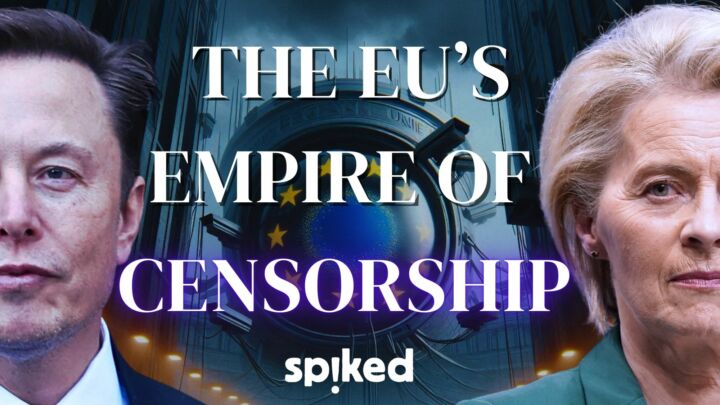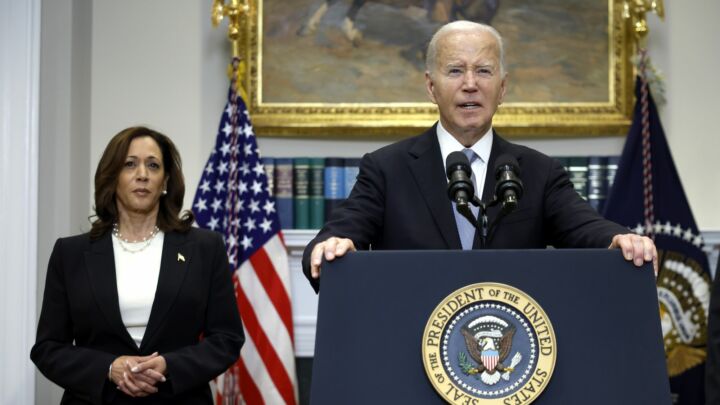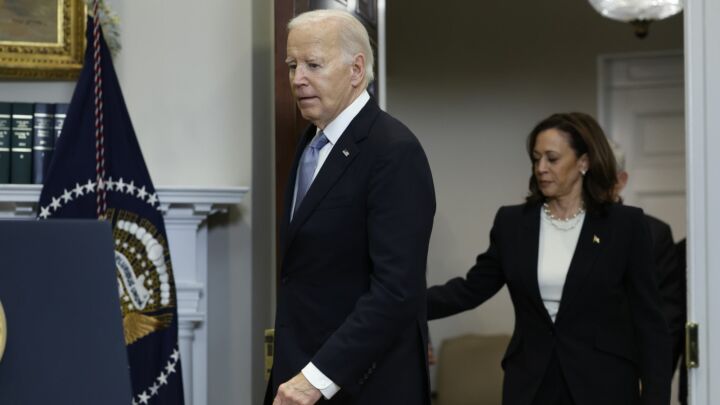‘We need to take back control from the ECHR’
David Frost on why Brexit was just the beginning of the democratic change we need.

Almost eight years on from the Brexit referendum, has the UK really managed to ‘take back control’ of its sovereignty? All too often it seems as if government policy is still being frustrated by Europe, only this time by the European Convention on Human Rights (ECHR). This is especially clear when it comes to migration. The UK may no longer be bound by EU freedom-of-movement rules, but migration policy is still being shaped by non-democratic bodies – whether that be judges in Strasbourg or British judges applying ECHR rules. The Conservative government’s Rwanda policy, in particular, is continually being bogged down in the courts.
David Frost – former chief Brexit negotiator – returned to The Brendan O’Neill Show to explain the dangers this all poses to British sovereignty, and why Brexit was just the beginning of the democratic revolution we need. What follows is an edited extract from their conversation. Listen to the full episode here.
Brendan O’Neill: How would you explain this ongoing hostility that sections of the political classes – be it Labour, the Conservatives or the media elites – feel towards Brexit?
David Frost: There are lots of things behind the elite hostility towards Brexit. Some of it stems from the honest, reasonable and traditional internationalism of the Labour Party – the idea that it’s always better to cooperate with other countries. Of course, the simple response to this is that international cooperation does not have to be done within the particular institutional framework of the EU. We can cooperate in other ways. This misconception forms part of the hostility towards Brexit, but it’s certainly not a very strong position. After all, it relies on the mistaken belief that the EU is historically inevitable and that, through Brexit, we’re standing against the natural flow of history.
There is also a deep lack of belief in democracy that has always existed among Britain’s intellectual class, which George Orwell pointed out more than 80 years ago. Elites seem to believe that the best way to govern the country is for the supposedly clever people to get together and tell everybody else what to do. The EU is the apotheosis of exactly this idea. It has been this way ever since Jean Monnet founded its predecessor, the European Coal and Steel Community. And it was embodied most famously in the sort of speeches that Jacques Delors delivered in the European Parliament in the 1980s.
In Britain, the EU was an incredibly effective way of getting things done when there was no actual democratic consensus. The Labour Party, in particular, loved this fact. But Brexit shattered all those hopes regarding the ‘right way’ of governing the country. Now Remainers are trying to piece those hopes back together. If we give Labour the chance, it will definitely try and bring us back in.
O’Neill: What are your thoughts on the ECHR? Should Britain ditch it?
Frost: My thinking has certainly evolved on this question over the past five years. In 2019, I didn’t think it was necessary to get out of the European Convention on Human Rights. It’s an important, reputational document that goes back quite a long way, and it’s not something that we should casually dismiss as though it no longer matters.
However, the past five years have shown that the ECHR makes it increasingly difficult to take fundamental decisions about the way this country is run. Combined with Britain’s particular kind of judicial system, litigious culture and the strong influence of government lawyers, the ECHR continually subverts government policy – especially when it comes to border control. The ECHR is, of course, not the only obstacle to progress on these issues. But we need to be ready to overrule bits of it, if necessary, to take back control in the most important policy areas.
More broadly, we need to reaffirm the idea that parliament has the last word. And we need to reestablish the fact that parliament can legitimately go against international laws and treaties if it wishes to do so. These decisions will obviously have political consequences and we shouldn’t make them casually. But, in the end, parliamentary decisions are the supreme legal authority in the UK. We drifted away from this idea in the debate over the Internal Market Act 2020, and we are seeing that drift again in the debates around the various Rwanda bills. It is very important that we re-establish the fundamental principle of parliamentary sovereignty. Otherwise, British governments can simply sign treaties with the rest of the world that effectively sidestep democratic scrutiny in the UK.
Sadly, the idea that we need these sort of Platonic guardians in the courts to tell us what we should do has become deeply established in British politics. And if we let this worldview continue for much longer, it may become too late to push back against it. Personally, I find it deeply depressing that Britain – the country that invented the kind of civil rights and freedoms that most Western democracies try to abide by – is now thought to be incapable of guaranteeing them for its own citizens. Just look at how during the Covid-19 pandemic much of our civil rights were initially thrown out the door. In the end, however, a strong force within the House of Commons eventually brought us out of that lockdown mentality – and much earlier than our neighbours in Europe, too.
So, at the very least, we have a recent example of where parliamentary politics has proved a better protector of people’s rights than all the people who thought they knew best. Let’s hope that it isn’t the last.
David Frost was talking to Brendan O’Neill on The Brendan O’Neill Show. Listen to the full conversation here:
Picture by: Getty.
To enquire about republishing spiked’s content, a right to reply or to request a correction, please contact the managing editor, Viv Regan.









Comments
Want to join the conversation?
Only spiked supporters and patrons, who donate regularly to us, can comment on our articles.